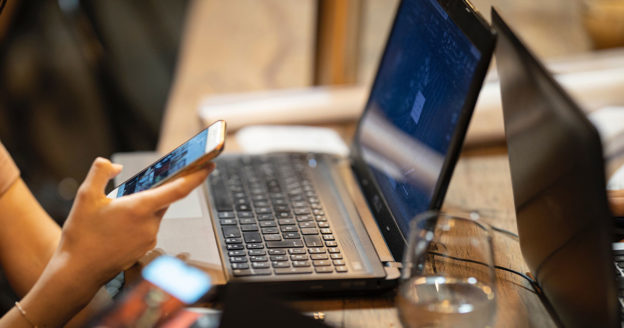In the digital age we’re living in, it’s quite common for some of us to work at a PC all day, then head home and read an e-book, watch TV or browse our mobile phones. However, this over-exposure to digital screens can cause real damage to our eyes. This is due to the blue light emitted from these devices.
What is blue light?
Sunlight is a combination of red, orange, yellow, green, blue, indigo and violet light. This combination makes up the white light that we see. Visible blue light has rays of short wavelengths and high energy. Blue light is everywhere, and its main source is the sun, so it’s quite natural to be exposed to it. It’s actually what makes the sky look blue!
Our exposure to blue light
Digital devices such as computer and mobile phone screens, flat-screen televisions and LED lights all emit blue light. So, although we are naturally exposed to a lot of blue light, this is increased a lot through man-made technology. On average, British people spend 6 hours each weekday looking at screens! So, what are the dangers of this?
The human eye doesn’t block blue light:
Almost all visible blue light passes straight through to the retina, in contrast, 99% of UV rays are blocked before reaching the retina.
Macular Degeneration:
Research has suggested that too much blue light can damage the light-sensitive cells in the retina. Long-term, this can lead to vision loss and an increased risk of macular degeneration
Eye strain:
It’s much harder for the eye to focus on blue light. That means that when you’re looking at screens all day you can get eye strain. Symptoms of which include headaches, blurred vision and difficulty concentrating.
Reducing your blue light exposure
Some blue light exposure is needed for good health, so you don’t need to go the whole hog and protect yourself from all blue light exposure. In fact, the right amount of blue light can help improve alertness, memory and cognitive function. If you’re exposed to screens all day however, it could be a good idea to reduce this with blue light blocking glasses. You could wear them in the few hours before you go to bed, to help you wind down and get a proper night’s sleep.
If you have any concerns about your eyesight and digital blue light exposure, then please do get in touch and book an appointment with us. We can advise whether to get blue light blocking glasses and the best course of action.

